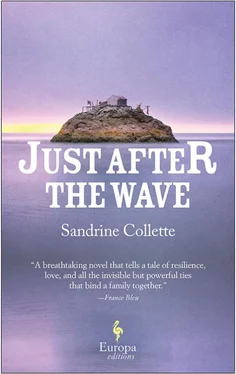In a life like his, you’re bound to run into strange characters and complicated situations. He’s seen it all. Made it through it all. Not that he’s come out on top, but then he didn’t expect to. All he knows is fighting and thieving—he’s good at that, damn sure. And if there’s one thing he’s learned, it’s that with those two gifts you can solve any problem. ’Course he won’t tell anyone any of that when he gets to the island. He’ll put on his good-boy mask, his stupid smile; sometimes it makes him look even scarier, so he checks his reflection in the water to make sure his jaws aren’t clenched and that his features are softer.
Not bad.
Has to remember not to laugh: he looks demented.
Sometimes he thinks he must be crossed with an animal. Bastard , he murmurs to himself.
On the shore there are figures moving restlessly. So he’s been spotted. His throat tightens: the excitement of something new, maybe dangerous, maybe not, a confrontation with other people, and his life is such a solitary one, this’ll be a break, a challenge. In a hushed voice he says, I’m coming.
He’s ready. Lie low, cross swords, jump out of the boat, run away if anything seems dicey; beg, weep, keep quiet, tell them some story he’s made up from beginning to end, once again.
So he is prepared for anything.
Except for the three pairs of wide eyes staring at him when he finally steps on land, disgusted by all that ocean, and ties the boat to a tree next to the drowned jetty.
What the hell is this, thinks Ades, looking at them, what sort of welcome, this circus, one kid with a twisted leg, another one knee-high to a grasshopper, and a little girl with a blank eye; he has to refrain from bursting out laughing, this is a freak show, where are the others hiding? There’s something disturbing in the eyes of the kids standing there, a special light, like a huge expectation tinged with bitterness, as if they’d been hoping for him with all their might—yes, this is the impression he’s getting—and that when he finally stood there before them, everything collapsed. So that’s the effect he has on these three brats, a disappointment scarcely concealed by their stunned expressions, their downturned mouths. Ades suddenly gets it: they were expecting someone else.
He hasn’t said a word yet.
Nor have they.
He finishes mooring the boat, takes his bag, walking heavily, a few steps. He stands up straight, slowly, feels his back straining after all these days on the water where every movement was made hunched over. The kids watch him. He walks toward them, no hurry. There’s no rush—he surveys his surroundings, tries to see whether there could be anyone hiding, he listens carefully. And he doesn’t want to frighten them, doesn’t want them to go shouting and raising the alarm. He pretends to be walking along an invisible path; when he draws level with them he turns his head toward them. All he says:
“Hey.”
The smallest one smiles: Hey. The two older ones don’t say a thing.
“I’m looking for your parents.”
This time, too, only the little boy opens his mouth. They’re not here.
Ades raises his eyebrow. It’s strange how incongruous his answer seems in a place like this, where there’s nowhere to go, and the kid saying it as naturally as if he were saying, They went shopping . Yes, but where? So Ades lowers his eyebrow in a frown and asks:
“Where are they?”
“They left.”
“When are they coming back?”
“In… six days.” Noah counted on his fingers and glanced questioningly at Louie and Perrine.
Goddamn, thinks Ades, either this kid is a half-wit, or he’s making fun of me. But the two next to him don’t seem to think it’s funny. He decides to be patient.
“Oh,” he says. “So who is here on the island?”
“We are.”
“And who else?”
“Nobody.”
“Are you telling me you live here all alone, the three of you?”
The little boy nods.
“Our parents left with the others, ’cause of the rising water. There wasn’t enough room on the boat, so they left us. But Pata is going to come back and get us.”
“In six days.”
“Yes. But Louie says that in six days there won’t be any more island and we’ll all be drowned.”
Ades surveys the land besieged by the sea. In his opinion the kid’s not wrong, and he turns to him.
“You’re Louie?”
The bigger boy nods.
“Is there anything to eat here?”
The little girl breaks in:
“There’s some but not a lot, otherwise we won’t have enough until Pata gets here.”
“Let’s go check it out. I’m starving.”
The little boy follows close on his heels, skipping.
“Do you like eggs? We have eggs.”
“That’ll do me. I’ll have six.”
“Six?”
There is surprise on the kid’s face but not only. A sort of amazement. In spite of himself, Ades smiles, mechanically counting his steps from the shore to the house, an old habit he hardly notices.
“Who does the cooking?”
“Perrine does. Sometimes Louie helps her, and me too.”
“Okay. Perrine, make me six eggs.”
The little girl does not abandon her look of surprise, but takes a big frying pan out of a cupboard. Noah adds:
“And we want to eat the hens, but Louie won’t let us. And we don’t know how to fix them.”
“I’ll fix them for you, your hens. I haven’t had any decent meat in weeks, so if that’s all it takes to make you happy…”
“Yay!”
Afterwards, Ades cannot recall that he’s ever had a meal with three kids sitting around him, not eating, not speaking, just looking at him. In the beginning it bothers him a little; but then deep down he doesn’t give a damn about these weird kids with no parents, and he wonders if he should believe their story; yet he sniffed around, kept his ears open, didn’t see or hear anything, they really are alone, just the three of them.
The four of them, now.
He feels as if he’s some sort of god there among them, as they go on gazing at him. Or maybe he’s an ogre, the way he’s gobbling down his eggs and pancakes, washing it all down with some bad wine he found in the barn and uncorked with delight: no more having to drink that damned water. But it annoys him to have to eat in front of these brats, are they going to watch him sleeping, too, and he slams his fist on the table:
“That’s enough!”
The kids hardly move. They’re not afraid.
It hasn’t happened often, Ades barging in somewhere so abruptly and inconsiderately, to find opposite him people who aren’t trembling.
On the contrary: at times he catches the gazes they exchange among themselves, little stolen sidelong glances at each other with a faint smile, as if they were pleased—yet if they only knew the true nature of his company, for sure their faces would fall, then.
“Where is the bedroom?”
He has asked Noah. He has realized the little one is the least fierce, even if he seems on the slow side now and again—that’s still better than the older silent one or the girl who always seems to think before she speaks.
“What bedroom?”
“My bedroom. I have to sleep. I’ve been on the sea for a week.”
“Well…”
Noah tries to answer, turning to Louie and Perrine, hesitant.
“There’s our parents’ room, but—”
“That’ll do.”
Ades stands up, grabs him by the collar.
“Move it, show me.”
He follows him down the corridor, opens the door cautiously, by instinct, what if there is someone behind it—after all this time?
No one.
Ades puts his bags on the floor and sits on the bed. Perfect. He motions to Noah.
Читать дальше












